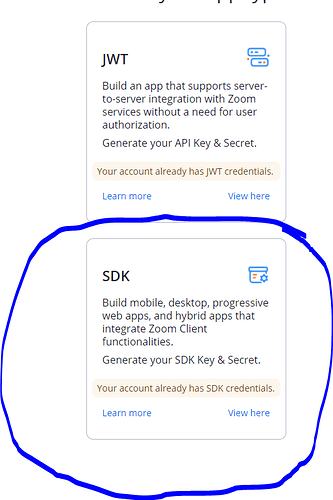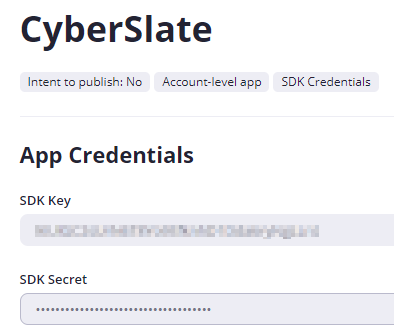Description
App encounters error #13023, AUTHRET_KEYORSECRETWRONG
Which version?
version 5.2.1 (42037.1112)
Screenshots
Zoom SDK initialized (version 5.2.1 (42037.1112))
Created AuthService successfully
Set authorization service event handler successfully
Registered network connection helper successfully
INetworkConnectionHelper: proxy detect complete
Using JWT authorization
Set app authorization successfully
onAuthenticationReturn: 2 Key or secret wrong
Last Zoom error: 1 13023 “”
Additional context
Windows 10 (20H2 Build 19042.630)
Qt 5.10, MinGW C++ / MSVC++ Visual Studio 2019
Web domain for testing is: https://zoom.us
App key and secret are taken from my app’s “App Credentials” page on the Zoom Marketplace.
- sdk_demo_v2 is compiled and running properly on my computer.
- I run my own app, it generates a JWT on the fly and calls SDKAuth(AuthContext) with the JWT set. The authorization service returns 2 (AUTHRET_KEYORSECRETWRONG) and IZoomLastError::GetErrorCode returns 13023.
- I copy the JWT from my app and paste it into sdk_demo_v2 (on the same computer, in the same directory, with the same Zoom SDK DLLs), click the “Auth” button, and authorization proceeds successfully and the login page is displayed.
So: I know the JWT is valid and accepted for authorization. But, the same JWT in my app always ends in error 13023. I assume that app is doing something wrong during the handshake, or not doing something that is required.
Why does the same JWT work for sdk_demo_v2 but not for my app? This is the puzzling question.
Any suggestions would be appreciated.



 To cover all of the bases, you aren’t authorizing the SDK in multiple instances simultaneously? As in, you aren’t trying to authorize the SDK in your own application while it is currently authorized in the demo application?
To cover all of the bases, you aren’t authorizing the SDK in multiple instances simultaneously? As in, you aren’t trying to authorize the SDK in your own application while it is currently authorized in the demo application?